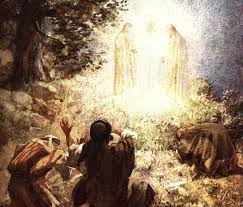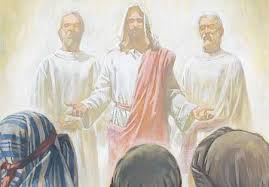
– 08-3-2014-
Second Sunday of Lent
Gospel text : Matthew 17:1-9
vs.1 Jesus took with him Peter and James and his brother John and led them up a high mountain where they could be alone.
vs.2 There in their presence he was transfigured: his face shone like the sun and his  clothes became as white as the light.
clothes became as white as the light.
vs.3 Suddenly Moses and Elijah appeared to them: they were talking with him.
vs.4 Then Peter spoke to Jesus.
“Lord,” he said “it is wonderful for us to be here; if you wish, I will make three tents here, one for you, one for Moses and one for Elijah.”
vs.5 He was still speaking when suddenly a bright cloud covered them with shadow, and from the cloud there came a voice which said,
“This is my Son, the Beloved; he enjoys my favour. Listen to him.”
vs.6 When they heard this, the disciples fell on their faces, overcome with fear.
vs.7 But Jesus came up and touched them. “Stand up,” he said “do not be afraid.”
vs.8 And when they raised their eyes they saw no one but only Jesus.
vs.9 As they came down from the mountain Jesus gave them this order,
“Tell no one about the vision until the Son of Man has risen from the dead.”
********************************************
We have four sets of homily notes to choose from. Please scroll down the page for the desired one.
Michel DeVerteuil : A Holy Ghost Priest, Specialist in Lectio Divina
Thomas O’Loughlin: Prof of Historical Theology, University of Nottingham
John Littleton: Director of the Priory Institute, Tallaght 24
Donal Neary SJ: Editor of The Sacred Heart Messenger
*******************************************************
Michel de Verteuil
Lectio Divina with the Sunday Gospels – Year A
www.columba.ie
General notes
The three apostles experience the glory of Jesus in a wonderful way that will affect for ever their relationship with him (see 2 Peter 1:16-18). When did you, or someone you know, experience glory that until then had been hidden?
– In Jesus?
– In the Church community?
– In a friend or a member of your family?
– In a bible passage?
– In nature?
The story is told as a journey with different stages, and as you meditate on it you will find yourself recognizing these stages from your experience.
Text comments
– Verse 1 : To experience the transfiguration the apostles must entrust themselves to Jesus and let him lead them up a very high mountain where they can be alone.
– Verses 2 and 3 : They see not merely Jesus in glory but conversing with his great fore-runners who have been heroes to them.
– Verse 4 : Identify with Peter who would like to remain there forever.
– Verse 5 : Jesus is experienced as beloved Son of God, to be listened to with reverence, but this time through “a voice from the cloud”, a totally inner experience, a “blessed assurance”.
– Verses 6 – 8 : A very tender passage; Jesus gentle with the apostles, helping them to make the transition back to seeing him as he normally is, but now quite different because of the transfiguration experience. Who was Jesus in your life who did this for you?
– Verse 9 : The apostles return to ordinary living, but with a memory so deep that they know they cannot share it with others for the indefinite future.
Scripture comments
“There are three phases of prayer: me and Him; Him and me; just Him.” …Anglican Bishop Stephen Verney
Lord, we thank you that in this season of Lent
you will take with you many of your disciples and lead them
up a high mountain where you can be alone with them;
then, in their presence you will be transfigured,
your face shining like the sun
and your clothes becoming as white as the light.
We thank you that not only you, but Moses and Elijah
will appear to them, talking with you.
Surely they will cry out in their joy:
“Lord, it is wonderful for us to be here. If you wish, we will make three tents,
one for you, one for Moses and one for Elijah.”
We pray that you will lead them beyond what they can see and feel;
that a bright cloud will cover them with shadow
and from the cloud a voice may come, saying:
“This is my Son, the beloved; he enjoys my favour, listen to him.”
“The traveller cannot love because love is stasis and travel is motion.” …Derek Walcott
 Lord, we are afraid to get close to people,
Lord, we are afraid to get close to people,
to let them lead us up a high mountain where we can be alone.
And so they cannot be transformed in our presence
and we cannot hear the voice from the cloud
telling us that they are your sons and daughters, your Beloved,
that they enjoy your favour and that we must listen to them.
We pray for the Church in the world.
Help us that when people fall on their faces before you, overcome with fear,
we may come up and touch them, and say to them: “Do not be afraid.”
“We ought not to learn silence from speaking but rather by keeping silent we must learn to speak.” …St Gregory
Lord, help us to be content that when we raise our  eyes from a deep experience
eyes from a deep experience
we see only those who we are called to live with
and we come down from the mountain with them.
Lord, we thank you for those beautiful moments on the mountain, so deep that as we came down we knew that we must tell no one about the vision
until the Son of Man had risen from the dead.
***************************************
Thomas O’Loughlin
Liturgical Resources for the Year of Matthew
www.columba.ie
Note
In all three years, the gospel today is that of the Transfiguration (Matthew in A; Mark in B; Luke in C), and there are three themes running through the readings: (1) that God has established a covenant with his people which is realised in his making known to his people the Christ through a ‘voice from heaven’;
(2) that the disciples of the Beloved are ‘to listen to his voice’, and listening to the Word is presented as a key theme of Lent; and
(3) that just as the Transfiguration strengthened the first disciples for the coming passion of their Lord (Matthew) / Rabbi (Mark) / Master (Luke), so our hearing about it today should strengthen us and make us more responsive to the whole Paschal Mystery which we are preparing to celebrate.
Introduction to the Celebration
As we continue our Lenten journey towards Easter, we recall today the experience of the first disciples on their journey to the first Easter in Jerusalem. On a high mountain they beheld for a moment the glory of Jesus and heard the Father’s voice saying, ‘This is my Son, the Beloved, he enjoys my favour, listen to him.’ Let us now reflect that, forgiven our sins, we may behold Christ’s glory in this celebration, and let us ask the Spirit to help us hear Christ’s voice in our lives.
Homily Notes
1. This gospel challenges all the easy reductions that we make about Jesus:
A) Jesus the inspiring teacher,
B) Jesus the compassionate preacher,
C) Jesus the friend of the poor.
He is all these, but he is also the One who comes from the Father, the One who, we believe, was prepared for by the prophets, the One who stands at the centre of history. The transfiguration calls us to expand our religious horizons.
 2. But the story has a curious comic element: the Lord of history is transfigured with these earlier prophets each side of him, and Peter wants to set up a campsite! This shows the intimacy with which the human and the divine are present in Jesus:
2. But the story has a curious comic element: the Lord of history is transfigured with these earlier prophets each side of him, and Peter wants to set up a campsite! This shows the intimacy with which the human and the divine are present in Jesus:
he is with his friends and interacts with them; he is present in the glory of God. All handy distinctions such as ‘high christology’ versus ‘low’, or ‘immanence’ versus ‘transcendence’ are seen as too tied down to the limits of our understanding by this scene: God is always greater, and what we can say about God is what we can see in Jesus.
3. Preaching must not try to ‘explain’ this scene, nor even to ‘expand’ upon it. Rather the scene calls for our minds and imaginations to dwell on it and seek to make its ‘picture’ of the advent of God our own. So give a bit of the background that the first audience would have known, and then let imagination seek greater depths.
***********************************
John Litteton
Journeying through the Year of Matthew
www.Columba.ie
Gospel Reflection
During Lent, while we prepare to commemorate the death and resurrection of Christ and celebrate the everlasting life he shares with us at Easter, we are invited to review our lives in the context of our Christian faith and the teachings of his Church. Also, we are encouraged to repent of our sins and to do penance for them so that we can renew our relationship with Christ. Hence Lent is characterised by prayer, fasting and penance.
But these penitential aspects of Lent are not intended to discourage us even if they challenge us severely. Indeed, the example of the Church’s saints teaches us that those who are most disciplined and faithful to Christ  are those who display the greatest joy. It is a mistake to connect penance with unhappiness. The opposite is true. In fact, our society is full of people who are pursuing hedonistic pleasure, which they mistake for happiness, and who are miserable in the pursuit of false happiness.
are those who display the greatest joy. It is a mistake to connect penance with unhappiness. The opposite is true. In fact, our society is full of people who are pursuing hedonistic pleasure, which they mistake for happiness, and who are miserable in the pursuit of false happiness.
Lent is meant to be fundamentally a good experience because the established Lenten practices facilitate our ongoing conversion to the Gospel. So our prayer during Lent needs to be enthusiastically similar to the words spoken by Peter to Jesus during the Transfiguration:
‘Lord, it is wonderful for us to be here’ (Mt 17:4).
Lent offers us a yearly opportunity to undergo conversion from sin. It is only when we abandon sin that we can truly begin the pursuit of authentic happiness and experience the joy of the saints in our lives. Sin alienates us from God and, often, from other people. So it is imperative that we eradicate it from our lives.
Then we are drawn closer to Jesus and that is our purpose here on earth — to become close to Jesus because God made us to know, love and serve him in this world so that we may be happy with him forever in heaven. An appropriate prayer, therefore, is: It is wonderful for us to be here.
 However, as we know, Lent is quite demanding and requires considerable spiritual discipline, especially if we are not in the habit of fasting and doing penance. It would be impossible for us to embrace wholeheartedly the challenges of the Gospel while depending on our own resolve alone. For that reason, we need to remember Jesus’ consoling words to his close friends when they were frightened on the mountain: ‘Stand up, do not be afraid’ (Mt 17:7). We are never alone.
However, as we know, Lent is quite demanding and requires considerable spiritual discipline, especially if we are not in the habit of fasting and doing penance. It would be impossible for us to embrace wholeheartedly the challenges of the Gospel while depending on our own resolve alone. For that reason, we need to remember Jesus’ consoling words to his close friends when they were frightened on the mountain: ‘Stand up, do not be afraid’ (Mt 17:7). We are never alone.
Our Lenten motto becomes: It is wonderful for us to be here. In addition, we are encouraged by Jesus’ words: ‘Do not be afraid.’ They remind us that he is in control. Jesus also spoke these words to Peter in the boat when a storm raged all around them. He was teaching them — and us — not to fret but to trust in God’s providence.
A central message of Lent is that, at least metaphorically, we put on sackcloth and ashes, do penance for our sins and seek to make progress in the spiritual life, thereby uniting ourselves with the suffering Christ. By taking such practical steps, we can be sure of pleasing God and growing in true happiness and real joy.
For meditation
Jesus took with him Peter and James and his brother John and led them up a high mountain where they could be alone. (Mt17:1)
*********************************************
Donal Neary SJ:
Gospel Reflections for Sundays of Year A: Matthew
www.messenger.ie/bookshop/
On the mountain
The hours on the mountain were a huge experience for Peter, James and John, who would always be with him. They saw him in his glory, the beloved son of the Father. There was more to him than meets the eye.
You climb a mountain and you see new views, you see the city from a new vantage point. You see the countryside in its beauty. We need times to climb mountains and get away from the ordinary. Lent is a time like that – as we give something up, we take something on.
 From the mountain, we now return home with a good seed: the seed of the Word of God. The Lord will send rain and that seed will grow. It will grow and it will bear fruit. We thank the Lord for the seed but we also want to thank the sower because you were that sower and you know how to do it/ (Pope Francis, 2014)
From the mountain, we now return home with a good seed: the seed of the Word of God. The Lord will send rain and that seed will grow. It will grow and it will bear fruit. We thank the Lord for the seed but we also want to thank the sower because you were that sower and you know how to do it/ (Pope Francis, 2014)
Whenever we climb the mountain of the Lord or make any journey with him, we are changed. As every mountain is different, so every moment with him is well worth while!
We receive this word of God and we receive our call to share it. The apostles would spend their lives sharing what they got on the mountain, and how it changed them,
Is there a word or line of scripture that you like and which helps you?
Repeat it to yourself as a prayer.
Lord, make me a listener to your word.
********************************************